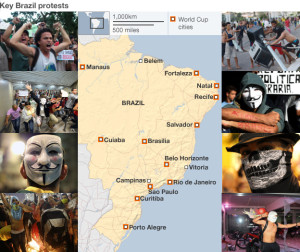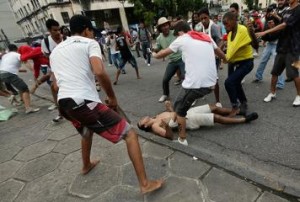I’ve been commenting on the kinds of mass protests (and riots) now raging across Brazil for almost a decade. I refer you to the following in The iPINIONS Journal: “Revolution in the Middle East” (March 2, 2005), “Alienated Youths Masquerading as Grieving Students Still Rioting in Greece” (December 13, 2008), “Tunisian Revolution Sets Off Arab Spring” (January 28, 2011), “Now London is Burning” (August 9, 2011), “Occupy Wall Street” (October 6, 2011), “Australia’s Aboriginal Spring” (January 27, 2012), “Now Stockholm is Burning” (May 13, 2013), “Turkey’s Erdogan No Different from Syria’s Assad…?” (June 3, 2013).
This list is far from exhaustive; not least because it does not include any of the many commentaries I’ve written on mass protests (and riots) that raged from Egypt through Jordan and Libya during the Arab Spring.
These riots demonstrate what little spark it takes for the simmering resentment that burns in ghettos to set nearby cities ablaze and terrorize an entire country….
And, there but for the grace of God…
(“World Beware, French Riots Affect Us All, The iPINIONS Journal, November 8, 2005)
 In Turkey, the little spark that set off ongoing mass protests (and riots) was the government’s decision to requisition a city park for commercial development. In Brazil, it was the government’s decision to raise fares on buses and metros.
In Turkey, the little spark that set off ongoing mass protests (and riots) was the government’s decision to requisition a city park for commercial development. In Brazil, it was the government’s decision to raise fares on buses and metros.
Incidentally, the first “Free Fare Movement” demonstrations began in Natal last August; they spread to other cities throughout most of this year; and reached what appears to be their most devastating and consequential manifestation in São Paulo, Brazil’s largest city, earlier this month – after the government raised fares by a seemingly innocuous .09 cents: The proverbial straw that broke the camel’s back…?
A common feature of these protests is their decentralized nature and tower-of-babel sense of purpose. But this is not to say that the protesters are not venting wholly legitimate grievances.
Here, for example, is how I characterized those grievances (in the commentary cited above) with respect to France almost a decade ago:
Reports are that young people in France’s African (Muslim) communities erupted in this nightmarish violence because they are fed up with chronic unemployment and feelings of (religious and racial) discrimination and social alienation. Indeed, just as young blacks in America fought against the virulent racism their parents tolerated, it seems young Muslims in France are fighting against the caste-like presumption that they too will supply the cheap labor for rich Frenchmen their parents provided.
Now, not just Paris, but all of France is burning.
And here’s how the BBC characterized those grievances with respect to Brazil just days ago (on July 19):
The objectives of this diverse protest movement are very broad, such as demanding better education and health services; a sluggish economy and inflation that is affecting the lives of ordinary Brazilians every day can be added to the mix.
Politicians with high salaries giving jobs and flights to relatives are widely scorned.
Inequality and the huge cost of hosting the World Cup and the Olympics are key issues raised by demonstrators alongside corruption, crime and police brutality.
 Meanwhile, just as it was/is with every other leader, Brazilian President Dilma Rousseff seems utterly clueless about what is required to quell these protests. And I don’t see how running to her predecessor and mentor Luiz Inacio Lula da Silva, the reputed people’s president, will help. After all, these protests are playing out more like scenes from the zombie apocalypse than protest marches from the civil rights movement.
Meanwhile, just as it was/is with every other leader, Brazilian President Dilma Rousseff seems utterly clueless about what is required to quell these protests. And I don’t see how running to her predecessor and mentor Luiz Inacio Lula da Silva, the reputed people’s president, will help. After all, these protests are playing out more like scenes from the zombie apocalypse than protest marches from the civil rights movement.
Indeed, she probably thought, quite reasonably, that announcing a rollback in the fare increases that sparked them would be like daylight to vampires (with apologies to vampires who are considered a much higher form of zombies). But the effect was like pouring fuel on an already raging fire. Now, not just São Paulo, but all of Brazil is protesting (and rioting).
Alas, trying to reason with this motley crew of protesters is rather like tying to tame a pack of hungry hyenas that just got whiff of the blood of a dying gazelle.
 Then, of course, another common feature of these protests is the way they are invariably commandeered by marauding anarchists who want nothing but chaos and perpetrate much of the rioting. This alienates many of the protesters. More significantly, in this case it has fueled such backlash among bystanders that they are not only taking to the streets to counter-protest the wanton destruction of their cities, but also physically confronting the (original) protesters.
Then, of course, another common feature of these protests is the way they are invariably commandeered by marauding anarchists who want nothing but chaos and perpetrate much of the rioting. This alienates many of the protesters. More significantly, in this case it has fueled such backlash among bystanders that they are not only taking to the streets to counter-protest the wanton destruction of their cities, but also physically confronting the (original) protesters.
‘I support these (protests), but I think it’s out of control,’ said Nilson Chabat, a 31-year-old gas station attendant on his way to work on Friday in São Paulo. ‘Many of us are angry but you can’t just go make a mess every day.’
(Reuters, June 22, 2013)
To be fair, though, at least Brazilians have something to show for their protests. By contrast, ask protesters elsewhere what concessions they can show for their efforts and you’ll be met with zombie-like stares….
 In any event, President Rousseff was wise to rollback the fares and strike a conciliatory note – promising, like a hostage negotiator, anything that will get protesters off the streets. For, on the one hand, it really is unconscionable to be raising transit fares on poor, working-class Brazilians, while gentrifying their neighborhoods to build billion-dollar stadiums and venues to host the soccer World Cup next year and the Summer Olympics in 2016.
In any event, President Rousseff was wise to rollback the fares and strike a conciliatory note – promising, like a hostage negotiator, anything that will get protesters off the streets. For, on the one hand, it really is unconscionable to be raising transit fares on poor, working-class Brazilians, while gentrifying their neighborhoods to build billion-dollar stadiums and venues to host the soccer World Cup next year and the Summer Olympics in 2016.
On the other hand, even if these protesters do not appreciate the reputational damage their actions are causing Brazil, the president is painfully aware that this ongoing unrest does not inspire confidence in the international community that Brazil will be able to host the World Cup, let alone the Olympics. In fact, safety concerns surrounding the “warm-up” Federation Cup could not be more dispiriting and inhibiting for foreign teams. And I fear only turning Brazil into a de facto police state will allay those concerns when it comes to the Olympics:
Riot police used gas bombs and pepper spray to keep protesters from advancing past a barrier around [two] miles from the stadium. A police car was burned by demonstrators, who also threw rocks and other objects at officers. The protest disrupted fans’ efforts to get in the stadium for Brazil’s second match at the World Cup warm-up tournament.
(The Independent, June 20, 2013)
But, perhaps on a more hopeful note, another common feature of these protests is the way they start with a bang and end with a whimper. The fact is that the narcissistic Facebookers and Twitterers who comprise the vast majority of all protesters have the self-esteem of teenage girls and the attention span of flying gnats. This is why, as soon as their protest is no longer the trending topic on the Internet (and cable TV), giving way to things like the latest rumors about Kimye’s baby or the final rounds of Arab Idol, protesters retreat to their lives of quiet desperation.
So even though these are clearly anxious times for political leaders in Brazil, I’m pretty sure these protests will die a media death before too long. Specifically, despite ongoing disruptions to the Federation Cup, when World-Cup fever hits soccer-crazed Brazil in earnest next year, I doubt you’ll find a single Brazilian willing to admit that he or she was in the streets today protesting against the building of stadiums to host this international event.
For now, though, the happiest leader in the world today has to be Turkish Prime Minister Recep Erdogan. After all, protesters in Brazil have usurped those in Turkey as the protesters du jour for international headline news. And, as indicated, for all protesters, the lack of mainstream media coverage is like a death sentence for their polyglot and amorphous cause….
Related commentaries:
World beware…
Turkey’s Erdogan…
* This commentary was originally published yesterday, Sunday, at 3:49